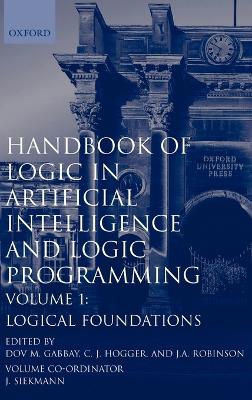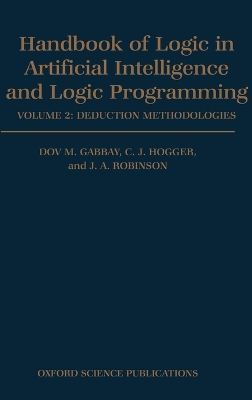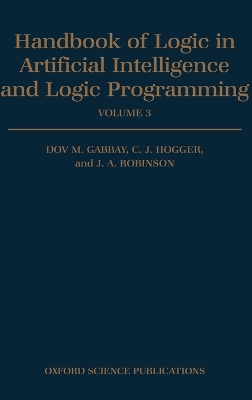Handbook of Logic in Artificial Intelligence and Logic Programming
3 total works
Volume 1: Logic Foundations
by Dov M. Gabbay, C. J. Hogger, and J. A. Robinson
Published 24 June 1993
Logic is now widely recognized to be one of the foundational disciplines of computing and has found applications in virtually all aspects of the subject, from software engineering and hardware to programming languages and artificial intelligence. This Handbook has been created in response to the growing need for an in-depth survey of the applications of logic in AI and computer science.
The Handbook of Logic in Artificial Intelligence and Logic Programming will be published in five volumes. Each volume provides a combination of authoritative exposition, comprehensive survey, and fundamental research exploring the underlying unifying themes in the various areas. this first volume presents the logical foundations and deduction methodologies extensively used in AI.
The Handbook of Logic in Artificial Intelligence and Logic Programming will be published in five volumes. Each volume provides a combination of authoritative exposition, comprehensive survey, and fundamental research exploring the underlying unifying themes in the various areas. this first volume presents the logical foundations and deduction methodologies extensively used in AI.
Volume 2: Deduction Methodologies
by Dov M. Gabbay, C. J. Hogger, and J. A. Robinson
Published 17 March 1994
Logic is now widely recognized to be one of the foundational disciplines of computing and has found applications in virtually all aspects of the subject, from software engineering and hardware to programming languages and artificial intelligence. There is a growing need for an in-depth survey of the applications of logic in Al and computer science. The Handbook of Logic in Articial Intelligence and Logic Programming and its companion, the Handbook of Logic in
Computer Science, have been created in response to this need. We see the creation of the Handbook as a combination of authoritative exposition, comprehensive survey, and fundamental research exploring the underlying themes in the various areas. The intended audience is graduate students and researchers in
the areas of A1 and logic, as well as other people interested in the subject. We assume as background some mathematical sophistication. Much of the material will be of interest to logicians and mathematicians. The tables of contents of the volumes were finalized after extensive discussions between handbook authors and second readers. The first volumes present the logical foundations and deduction methodologies extensively used in AI. Volumes 3 and 4 cover reasoning, and Volume 5 details logic
programming. The chapters, which in many cases are of monograph length and scope, emphasize possible unifying themes. They are written by internationally renowned researchers in the respective areas. The chapters are co-ordinated and their contents have been reviewed in joint meetings.
Computer Science, have been created in response to this need. We see the creation of the Handbook as a combination of authoritative exposition, comprehensive survey, and fundamental research exploring the underlying themes in the various areas. The intended audience is graduate students and researchers in
the areas of A1 and logic, as well as other people interested in the subject. We assume as background some mathematical sophistication. Much of the material will be of interest to logicians and mathematicians. The tables of contents of the volumes were finalized after extensive discussions between handbook authors and second readers. The first volumes present the logical foundations and deduction methodologies extensively used in AI. Volumes 3 and 4 cover reasoning, and Volume 5 details logic
programming. The chapters, which in many cases are of monograph length and scope, emphasize possible unifying themes. They are written by internationally renowned researchers in the respective areas. The chapters are co-ordinated and their contents have been reviewed in joint meetings.
Volume 3: Nonmonotonic Reasoning and Uncertain Reasoning
by Dov M. Gabbay, C. J. Hogger, and J. A. Robinson
Published 17 March 1994
Logic is now widely recognized to be one of the foundational disciplines of computing and has found applications in virtually all aspects of the subject, from software engineering and hardware to programming languages and artificial intelligence. There is a growing need for an in-depth survey of the applications in logic in A1 and computer science. The Handbook of Logic in Ariticial Intelligence and Logic Programming and its companion, the Handbook of Logic in
Computer Science, have been created in response to this need. We see the creation of the Handbook as a combination of authoritative exposition, comprehensive survey, and fundamental research exploring the underlying themes in the various areas. The intended audience is graduate students and researchers in
the areas of A1 and logic, as well as other people interested in the subject. We assume as background some mathematical sophistication. Much of the material will be of interest to logicians and mathematicians. The tables of contents of the volumes were finalized after extensive discussions between handbook authors and second readers. The first volumes present the logical foundations and deduction methodologies extensively used in A1. Volumes 3 and 4 cover reasoning, and Volume 5 details logic
programming. The chapters which in many cases are of monograph length and scope, emphasize possible unifying themes. They are written by internationally renowned researchers in the respective areas. The chapters are co-ordinated and their contents have been reviewed in joint meetings.
Computer Science, have been created in response to this need. We see the creation of the Handbook as a combination of authoritative exposition, comprehensive survey, and fundamental research exploring the underlying themes in the various areas. The intended audience is graduate students and researchers in
the areas of A1 and logic, as well as other people interested in the subject. We assume as background some mathematical sophistication. Much of the material will be of interest to logicians and mathematicians. The tables of contents of the volumes were finalized after extensive discussions between handbook authors and second readers. The first volumes present the logical foundations and deduction methodologies extensively used in A1. Volumes 3 and 4 cover reasoning, and Volume 5 details logic
programming. The chapters which in many cases are of monograph length and scope, emphasize possible unifying themes. They are written by internationally renowned researchers in the respective areas. The chapters are co-ordinated and their contents have been reviewed in joint meetings.


